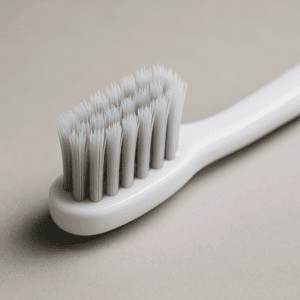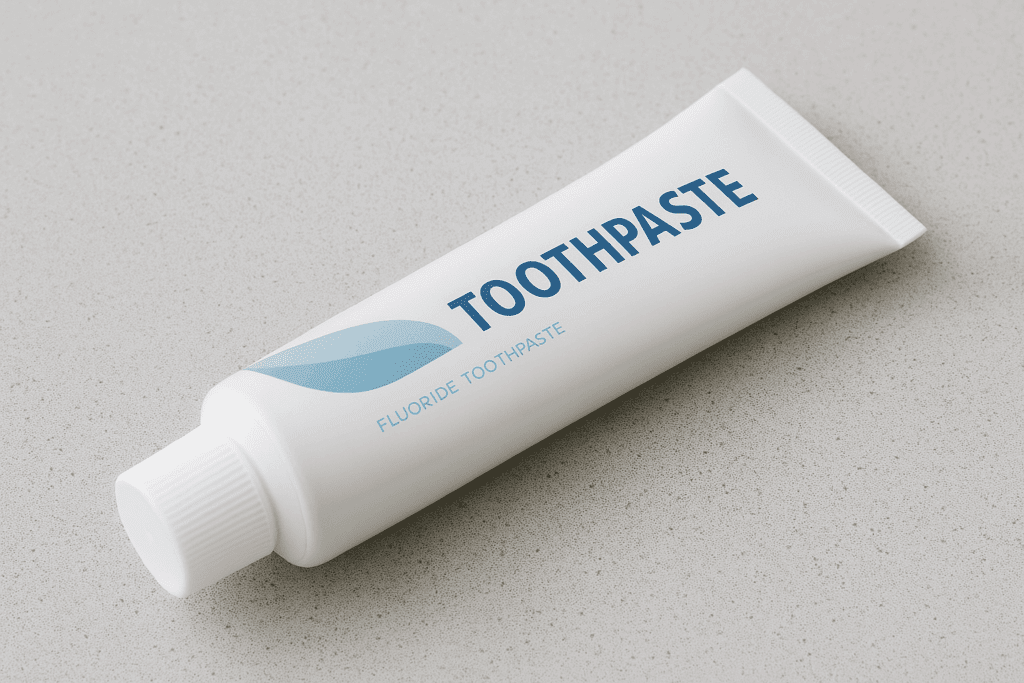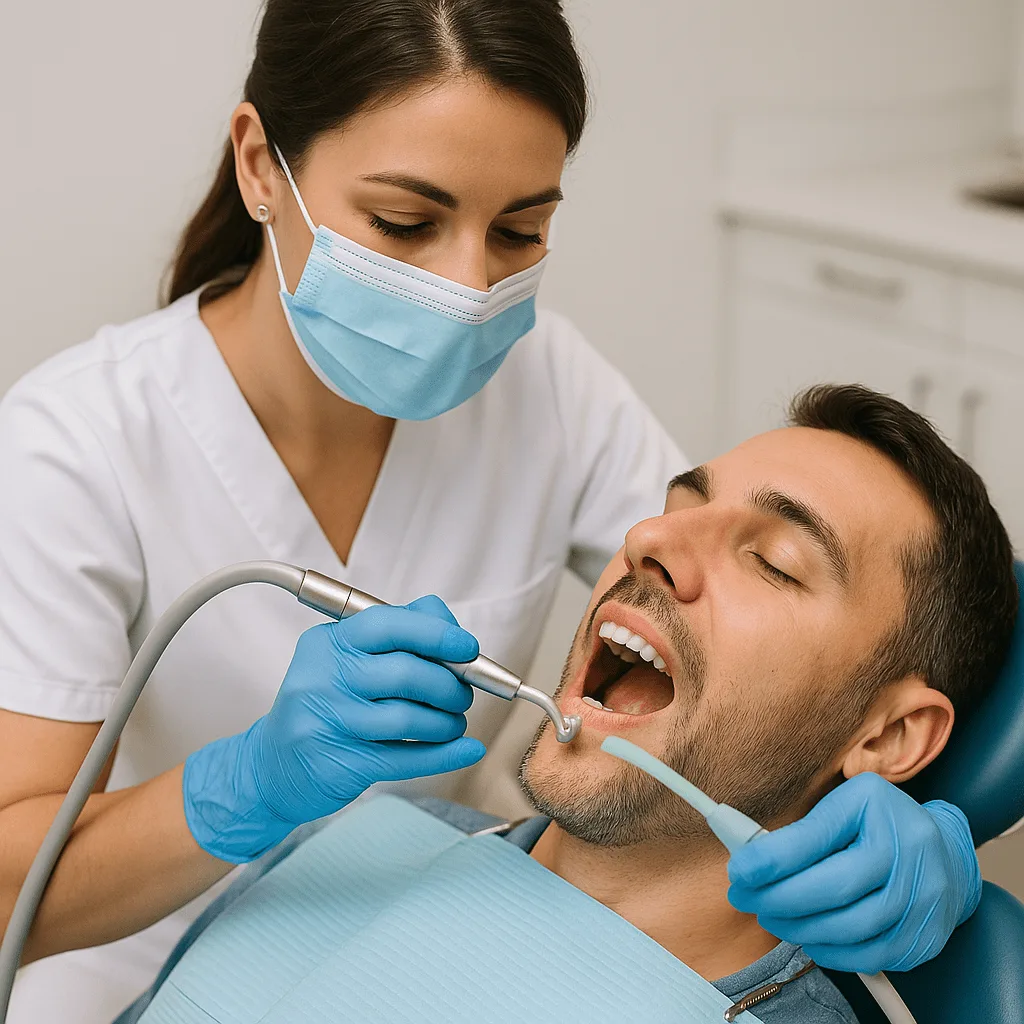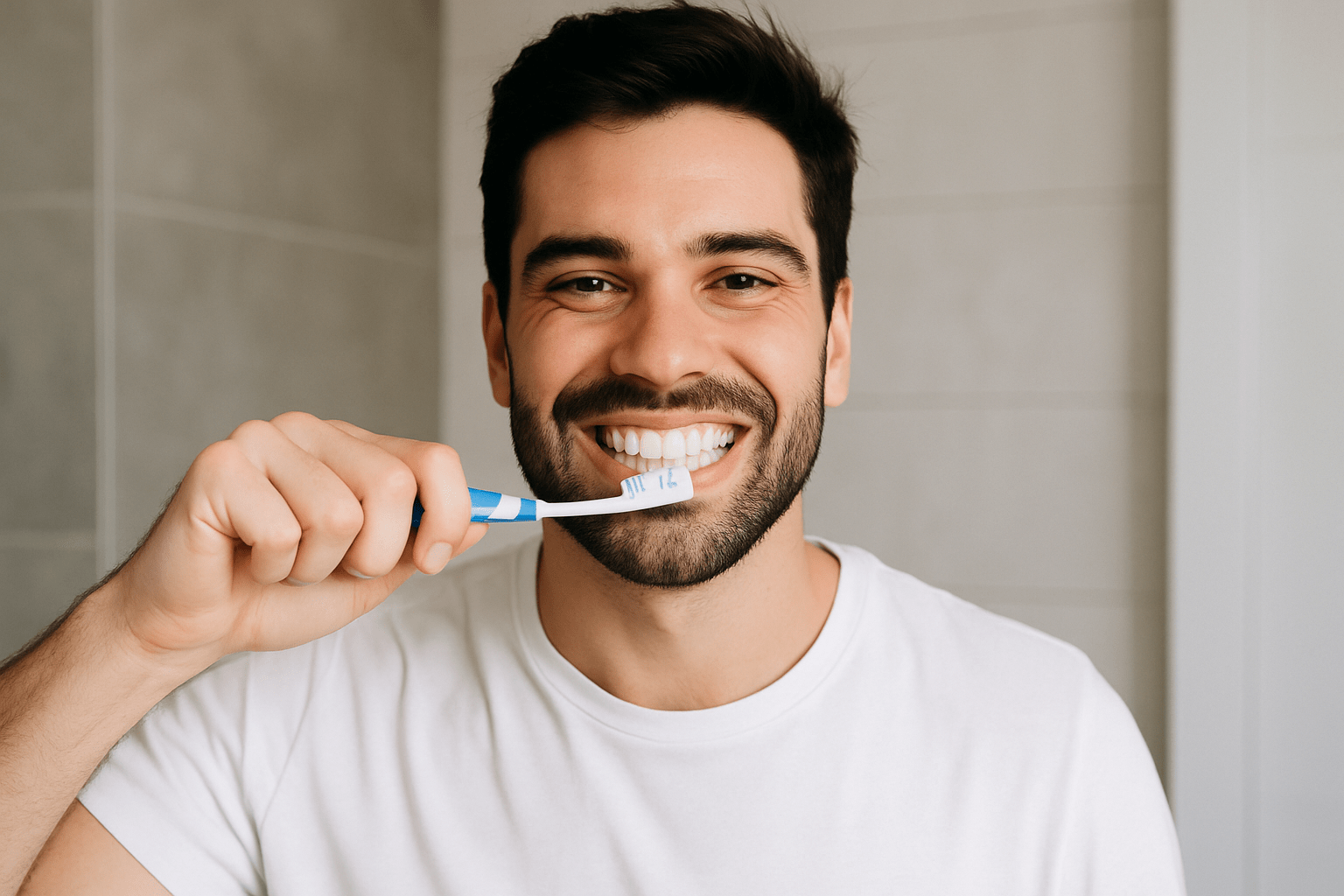You clean veneers just like your natural teeth.
The best way to clean veneers is to brush twice a day with a soft toothbrush and non-abrasive toothpaste, floss daily, and see your dentist for professional cleanings every six months.

What You Need to Know Before Cleaning Veneers
Veneers are thin coverings placed on the front of teeth to improve their shape, color, or alignment. The two main types are:
- Porcelain veneers. Durable, stain-resistant, and last 10–15 years with proper care
- Composite veneers. More affordable but less durable, usually lasting 5–7 years
Even though veneers are strong, they aren’t indestructible. The edges where the veneer meets your natural tooth (called the margins) can pick up stains if not cleaned well. And while the veneer itself won’t decay, the tooth underneath and the surrounding gums are still vulnerable if oral hygiene isn’t consistent.
A common concern I see is: “How do people with veneers keep their real teeth from rotting?”
The answer is simple and might surprise you. You clean veneers just like natural teeth. Brushing, flossing, and regular dental visits are what keep the natural tooth underneath healthy. As a bonus, you prevent problems like decay or gum disease.
7 Tips for Veneers Cleaning
1. Brush Gently Twice a Day with a Soft-Bristled Toothbrush

Just like natural teeth, veneers need to be brushed morning and night.
The key is to use a soft-bristled toothbrush and gentle strokes. Hard brushing or stiff bristles can wear down your enamel and irritate your gums. This puts stress on the edges of your veneers.
A soft brush removes plaque just as effectively as a hard one, but without the extra pressure or risk of scratching the surface. Think of it as polishing rather than scrubbing. You want to keep the veneers clean and shiny without damaging them.
@joycethedentist How to brush your teeth with an electric toothbrush that utilizes sonic vibrations. Let me know if you want a video for a round head oscillating style electric toothbrush! #electrictoothbrush #howtobrushyourteeth #dentalhygiene #sonictoothbrush
2. Use Non-Abrasive, Fluoride Toothpaste to Avoid Scratching Veneers

Not all toothpastes are veneer-friendly.
Whitening pastes, charcoal formulas, or anything with gritty particles can actually scratch the surface of porcelain or composite veneers. Those tiny scratches may not be visible at first, but over time, they make veneers look dull and more prone to staining.
Instead, choose a non-abrasive toothpaste with fluoride. Fluoride helps protect the natural teeth under your veneers from decay. The gentle formula keeps your veneers smooth and shiny.
If you’re unsure which toothpaste to buy, ask your dentist for recommendations. I often guide my patients toward safe, enamel-friendly options that also work well for veneers.
I created an entire guide for the best toothpaste for veneers with my top picks for 2025!
3. Floss Daily with Gentle, Waxed Floss or a Water Flosser
Flossing is just as important with veneers as it is with natural teeth.
Plaque and food particles often collect along the gumline and between teeth. Those are the areas your toothbrush can’t reach. If left behind, that buildup can lead to gum inflammation or even decay in the natural tooth under the veneer.
Use waxed floss or a water flosser to clean between your teeth without tugging at the edges of your veneers. Unwaxed or stiff floss can sometimes catch on the margins, while waxed floss glides more smoothly.
A water flosser is also a great option for patients who find traditional flossing difficult or uncomfortable.
View this post on Instagram
4. Rinse with Alcohol-Free Mouthwash to Protect Bonding and Gums
A daily mouth rinse helps reduce bacteria and freshen breath, but not all mouthwashes are safe for veneers.
Alcohol-based rinses can weaken the bonding resin that holds your veneers in place. They may also dry out your mouth, which makes staining more likely.
Instead, choose an alcohol-free, antibacterial mouthwash. It keeps your gums healthy, supports the teeth under your veneers, and helps prevent plaque buildup. All without risking the strength of the veneer bond.
The best mouthwash is alcohol-free, antibacterial, and gentle enough to protect both your veneers and your gums.
5. Avoid Staining Foods and Habits Like Coffee, Red Wine, or Smoking
Porcelain veneers resist stains better than natural enamel. But the edges where the veneer meets your tooth (and your surrounding teeth) can still discolor over time. Drinks like coffee, tea, and red wine, along with habits like smoking, are the biggest culprits.
If you do enjoy these, try rinsing with water afterward or using a straw for darker beverages. Small changes like these can help your veneers and natural teeth stay brighter for longer.
View this post on Instagram
6. Schedule Professional Cleanings Every 6 Months to Keep Veneers Polished

Even with great home care, plaque and surface stains build up around veneer edges.
A professional cleaning twice a year removes what brushing can’t. Then your hygienist polishes with veneer‑safe paste to restore luster without scratching.
These visits also let me check the margins, gums, and bite, catch tiny chips early, and touch up stains before they set.
If you’re prone to staining, dry mouth, or gum issues, aim for every 3–4 months instead of six.
7. Wear a Night Guard if You Grind Your Teeth to Prevent Chips or Cracks
If you clench or grind your teeth at night (a condition called bruxism), the constant pressure can chip or crack veneers over time. Since veneers are strong but thinner than natural enamel, they need a little extra protection.
Wearing a custom night guard creates a cushion between your upper and lower teeth. This reduces stress on both your veneers and your natural teeth.
Many of my veneer patients who grind notice that their smile looks better and lasts longer once they start wearing one.
Related reading: Tips For Sleeping With a Mouth Guard
Do Teeth Stay Clean Under Veneers?
Yes. Your natural tooth is still there under the veneer, which means it needs the same daily care as the rest of your smile. Veneers only cover the front surface of a tooth. So the back, the gumline, and the spaces between teeth are still vulnerable to plaque and decay.
If brushing or flossing is neglected, stains can appear along the edges where the veneer meets your natural tooth. This is one of the most common concerns I see among patients. They often notice a faint stain near the margin and worry it’s a crack or a chip.
In many cases, it’s just surface discoloration that can be polished away during a professional cleaning.
The takeaway: keep up with daily hygiene and routine cleanings, and your teeth will stay healthy under veneers.

Can You Get Veneers Professionally Cleaned?
Yes, veneers can (and should) be cleaned by your dentist or dental hygienist. We use special tools and polishing paste that are safe for porcelain and composite veneers, so the surface doesn’t get scratched or dulled.
Professional cleanings keep your veneers shiny. But they also give us a chance to check for early issues like small chips, staining at the edges, or gum irritation.
Catching these problems early means easier, less costly fixes and a longer lifespan for your veneers.
How Often Should Veneers Be Cleaned?
At home, veneers should be cleaned daily. That means brushing twice a day and flossing once a day to keep plaque from building up around the edges.
At the dentist, schedule a professional cleaning every six months.
What Is the Average Lifespan of Veneers?
The lifespan of veneers depends on the material and how well you care for them:
- Porcelain veneers usually last 10–15 years and sometimes longer with excellent care.
- Composite veneers last about 5–7 years before they need to be replaced.
Key Takeaways
- Veneers need the same daily care as natural teeth. Brush twice a day, floss daily, and rinse with alcohol-free mouthwash.
- Schedule professional cleanings every six months to keep veneers polished and catch small issues early.
- Avoid habits that can damage or stain veneers, like chewing ice, smoking, or frequent coffee and red wine.
- Porcelain veneers last about 10–15 years with good care, while composite veneers usually last 5–7 years.
- Veneers don’t protect the tooth underneath. Your natural teeth and gums still need regular care.
Follow me @joycethedentist for daily dental tips.





















